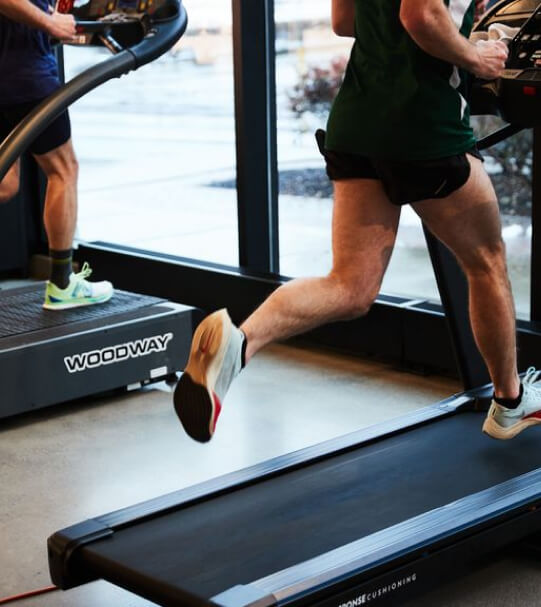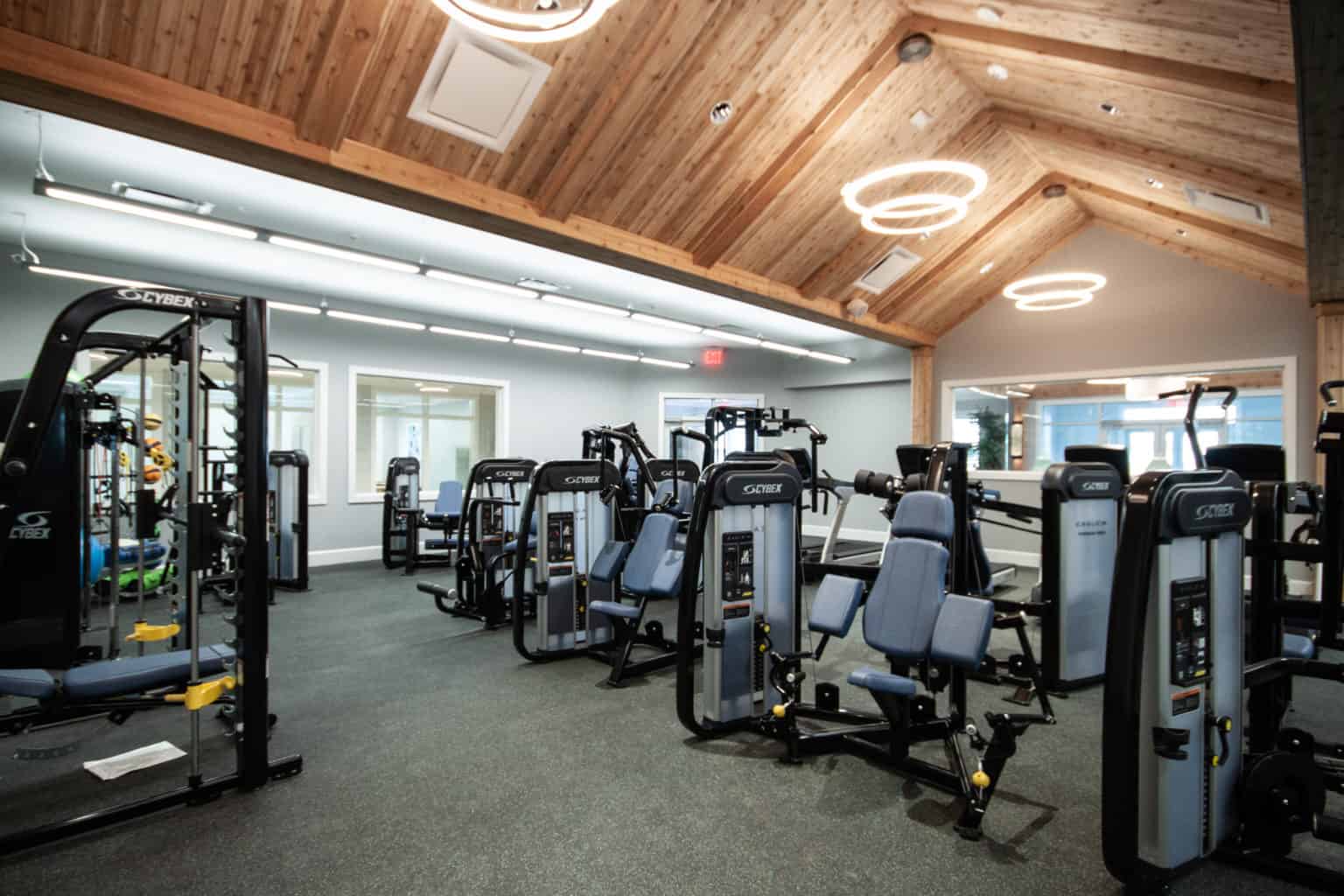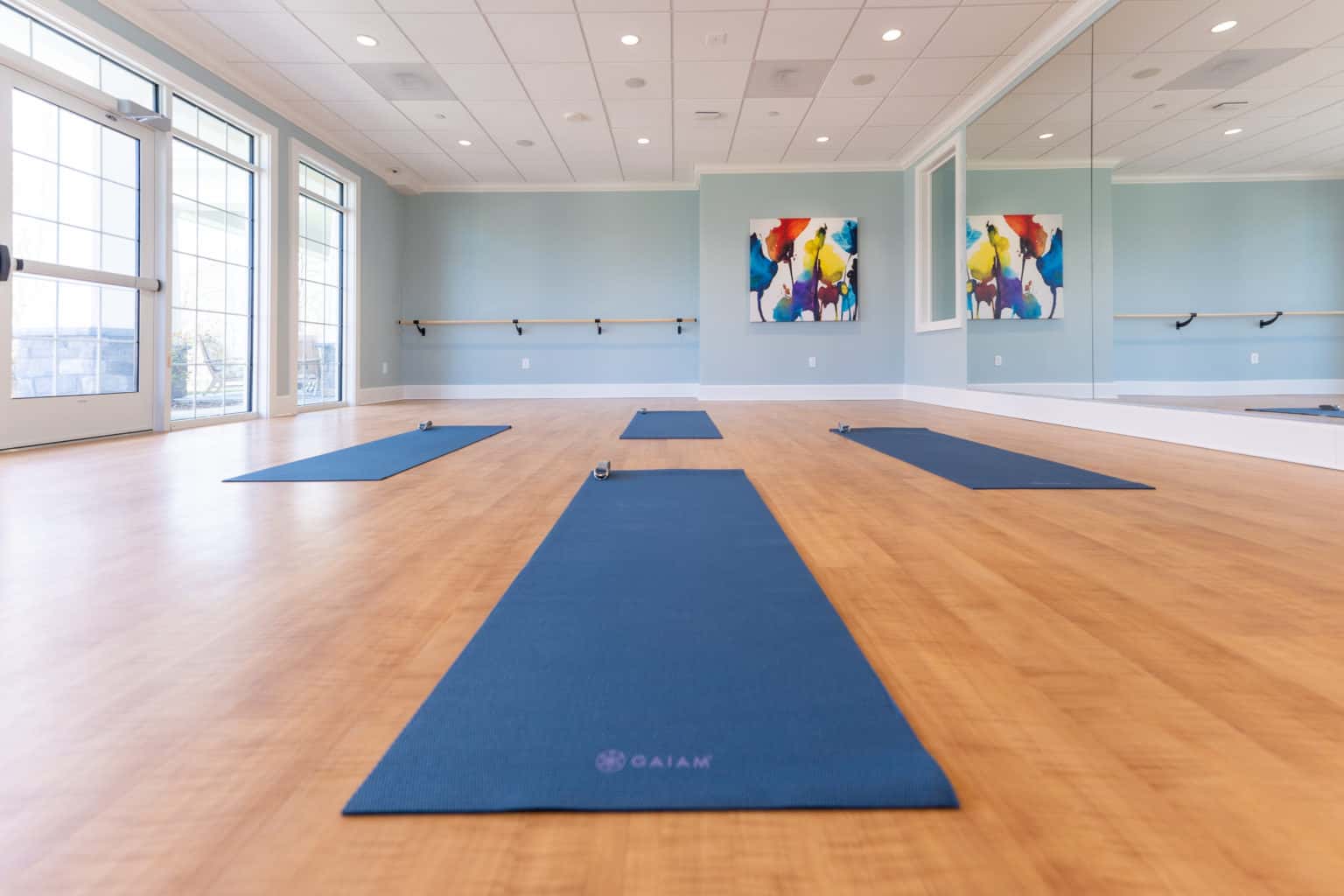
The Wellness Center at Wellbridge
Heal Mind, Body, & Spirit In Our New 10,000 SqFt Wellness Facility

Care For Your Body During Addiction Treatment
Starting your journey of addiction recovery also marks a profound commitment to healing your body along with your mind. At Wellbridge, we understand that true recovery requires whole-person, holistic care—care that addresses the interconnectedness of physical health with mental and spiritual well-being.
Our new 10,000-square-foot wellness center offers you a comprehensive approach to addiction treatment that prioritizes the nurturing and restoration of the entire self, giving you the space and the tools you need to jump-start the healing process.
Wellbridge recognizes that recovery extends beyond achieving sobriety; it’s about cultivating a lifestyle that fosters wellness in every aspect of your being. Through tailored interventions, therapeutic modalities, and a supportive community, we encourage our patients to move their bodies, fostering resilience and vitality as they navigate the path toward lasting healing and fulfillment.
How Can Exercise Impact the Mind and the Body?
Exercise exerts a multifaceted influence on both the mind and body, offering several benefits that extend far beyond physical fitness.[1] On a physiological level, regular physical activity stimulates the release of endorphins, neurotransmitters that act as natural mood elevators, promoting feelings of happiness and well-being while alleviating symptoms of stress, anxiety, and depression.[2]
Exercise also enhances cardiovascular health, strengthens muscles and bones, regulates blood sugar levels, and bolsters immune function, contributing to overall vitality and longevity.[3] Beyond its physiological effects, exercise also profoundly impacts cognitive function and mental well-being as well. Studies have consistently shown that engaging in regular physical activity improves cognitive abilities such as memory, attention, and executive function, enhancing brain plasticity and resilience against neurodegenerative diseases.[4]
Furthermore, exercise fosters neurogenesis—the production of new neurons—particularly in regions associated with learning and memory. This cognitive enhancement translates into improved academic performance, sharper focus, and enhanced creativity.
Additionally, exercise serves as a potent stress buffer, providing a healthy outlet for emotional tension while promoting relaxation and mental clarity. By integrating exercise into daily life, you can cultivate a harmonious balance between mind and body, unlocking your full potential for physical health, cognitive vitality, and emotional well-being.
Learn More About Our Programs We're ready to help you recover. Reach out now.How Exercise Improves Addiction Recovery
In addiction recovery, incorporating exercise into your routine can be a transformative tool for holistic healing. Physical activity not only helps manage cravings and alleviate stress but also contributes to overall well-being, fostering a sense of empowerment and purpose:[5]
- Craving management: Exercise provides a healthy outlet for managing cravings by releasing endorphins, reducing the intensity of cravings and withdrawal symptoms.
- Neurochemical balance: Regular physical activity restores neurochemical balance in the brain disrupted by substance abuse, promoting the production of mood-regulating neurotransmitters like dopamine and serotonin.
- Improved self-discipline and resilience: Engaging in exercise fosters self-discipline and resilience, instilling a sense of accomplishment and empowerment that reinforces sobriety efforts.
- Structure and purpose: Incorporating exercise into daily routines offers structure and purpose, replacing unhealthy habits with positive, goal-oriented behavior and promoting a renewed sense of identity beyond addiction.
- Stress reduction: Exercise serves as a natural stress reliever, helping you manage the emotional turmoil often associated with recovery and providing a healthy alternative to coping mechanisms like substance use.
- Increased prosocial support: Participating in group exercise activities or sports can facilitate social connections and support networks, reducing feelings of isolation and enhancing accountability in your recovery efforts.
What Exercise Programs Does Wellbridge Offer?
At Wellbridge, we offer a diverse range of exercise programs tailored to meet the unique needs and preferences of all our patients in their addiction recovery. Within our expansive 10,000-square-foot facility—solely dedicated to physical wellness and equipped with state-of-the-art amenities—our patients have access to a variety of exercise modalities designed to promote physical fitness, mental well-being, and overall vitality:
- Yoga: Our yoga classes and therapy provide a nurturing environment for cultivating mindfulness, flexibility, and inner peace. Through a combination of breath work, meditation, and physical postures, you can enhance your body-mind connection and alleviate stress, promoting holistic healing and self-discovery.
Wellbridge believes that exercise is an essential component of addiction recovery, offering a pathway to physical health, emotional well-being, and lasting sobriety. Through our diverse array of exercise programs, our patients can embark on a journey of self-discovery, empowerment, and transformation, reclaiming their bodies and their lives with renewed vitality and purpose.
Frequently Asked Questions About Exercise and Addiction Recovery
How often should I exercise during addiction recovery?
The frequency of exercise during addiction recovery can vary depending on your individual circumstances, including physical health, fitness level, and personal preferences. However, engaging in physical activity most days of the week, ideally for at least 30 minutes per session, is generally recommended for maximum benefit.
Will exercising help with managing stress and anxiety during recovery?
Yes, exercise is a powerful tool for managing stress and anxiety during recovery. Physical activity stimulates the release of endorphins, neurotransmitters that promote feelings of relaxation and well-being, while also reducing levels of stress hormones like cortisol. Regular exercise can provide a healthy outlet for emotional tension, enhance mood, and improve overall resilience to stress.
Is it safe to start exercising if I haven't been physically active for a long time due to addiction?
Yes, it is generally safe to start exercising after a period of inactivity due to addiction. However, it’s important to start gradually and listen to your body, especially if you have any underlying health concerns. Consulting with a healthcare professional or fitness expert can help you develop a safe and appropriate exercise plan tailored to your individual needs and abilities.
How does exercise contribute to rebuilding physical health after addiction?
Exercise plays a crucial role in rebuilding physical health after addiction by promoting cardiovascular fitness, muscle strength, and flexibility. Regular physical activity helps to reverse the negative effects of substance abuse on the body, such as weakened immune function and impaired organ health. Additionally, exercise can aid in weight management, improve sleep quality, and reduce the risk of chronic diseases associated with addiction.
Are there any risks or precautions I should be aware of when starting an exercise routine in recovery?
While exercise is generally beneficial for those in recovery, there are some risks and precautions to consider. Overexertion or pushing yourself too hard, especially in the early stages of recovery, can lead to injury or burnout.
It’s important to start slowly, listen to your body, and gradually increase the intensity and duration of your workouts over time. Additionally, if you have any underlying health conditions or concerns, it’s advisable to consult with a healthcare professional before starting an exercise program.
What if I have physical limitations or disabilities that affect my ability to exercise?
If you have physical limitations or disabilities that affect your ability to exercise, there are still many options available to stay active and improve your physical health. Depending on your specific needs and abilities, you may benefit from low-impact activities, which can be adapted to accommodate various levels of mobility. Working with a qualified fitness professional or physical therapist can help you identify safe and effective exercises tailored to your needs.
Sources
[1] Smith, M. A., & Lynch, W. J. (2012). Exercise as a Potential Treatment for Drug Abuse: Evidence from Preclinical Studies. Frontiers in Psychiatry, 2. https://doi.org/10.3389/fpsyt.2011.00082 on May 2, 2024
[2] Mayo Clinic. (2022, August 3). Exercise and stress: Get Moving to Manage Stress. Mayo Clinic. https://www.mayoclinic.org/healthy-lifestyle/stress-management/in-depth/exercise-and-stress/art-20044469 on May 2, 2024
[3] John Hopkins Medicine. (2023). Exercise and the Heart. Www.hopkinsmedicine.org. https://www.hopkinsmedicine.org/health/wellness-and-prevention/exercise-and-the-heart on May 2, 2024
[4] Mahindru, A., Patil, P., & Agrawal, V. (2023). Role of Physical Activity on Mental Health and Well-Being: a Review. Cureus, 15(1). https://doi.org/10.7759/cureus.33475 on May 2, 2024
[5] Patterson, M. S., Spadine, M. N., Graves Boswell, T., Prochnow, T., Amo, C., Francis, A. N., Russell, A. M., & Heinrich, K. M. (2022). Exercise in the Treatment of Addiction: A Systematic Literature Review. Health Education & Behavior, 109019812210901. https://doi.org/10.1177/10901981221090155 on May 2, 2024
Improved Physical and Mental Health Awaits
Addiction (and co-occurring issues) can be complex. Experience the transformative power of our comprehensive approach to improved physical and mental health at Wellbridge. Take the first step towards a brighter, substance-free future when you’re ready.


